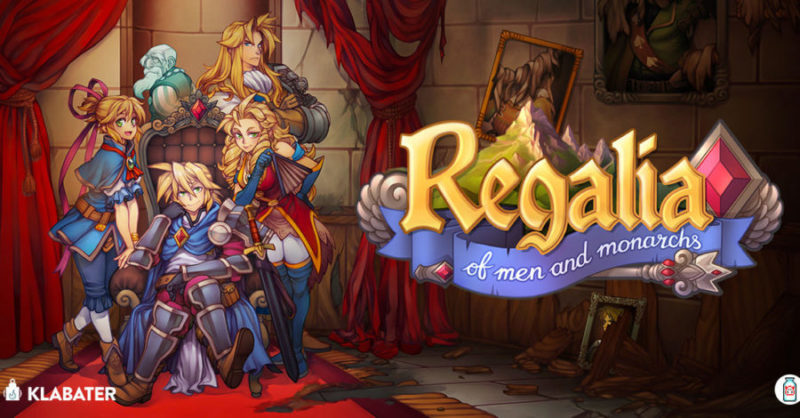The fantasy game genre has, in recent years, started to take itself rather seriously. Big baddies, moody soundtracks and sweeping landscapes have become as necessary as elves and dwarves. The recently released Regalia: Of Men and Monarchs chooses to take us in a different direction
.Regalia is a tactical RPG, with JRPG inspired artwork and a turn-taking battle system. Its story follows Kay, a young knight, his sisters and his loyal bodyguard, as they attempt to trace their family history and rebuild the long abandoned kingdom of Ascalia.
Regalia from the start takes a light-hearted look at the fantasy genre. In the prologue the jokes come thick and fast, but the first joke Regalia makes paves the way for later disappointments. The game begins when a dashing knight strides into frame.
This character looks interesting, charismatic and like a true leader, but, a cheesy narrator tells us that this is not our protagonist. It is instead the slightly more pathetic Kay – who walks into view weary and dejected. It’s a joke at the expense of our expectations of the fantasy genre, but beyond this point,
Regalia does very little to break new ground. This first joke is one in a number of anti-climaxes created in the pursuit of a quick laugh, and at the expense of better storytelling.
A knight must repay his debts
The plot traces a familiar fantasy trope; the hopeless hero, with very capable friends, that must get past their own inadequacies to save the day.
After their father dies, Kay and his sisters discover they have inherited the ruined kingdom of Ascalia. When the quartet arrive at the castle, they have another nasty surprise waiting. They have also inherited their family’s debt, which the debt collector Crucey would very much like to get back.
Considering the main antagonist of the game, you could be fooled into thinking that it will revolve around a hunt for money. Instead, Regalia deals in the currency of time. In each chapter, the player is given a number of kingdom quest objectives to complete, in a limited amount of days. Kingdom quests range from the completion of dungeons, crafting weapons, getting to know companions and rebuilding Ascalia.
The player can therefore, to some extent, play the game to his or her own tastes. Yet, each task is time consuming in different ways, and the player has to be careful to get objectives done before the end of the time limit. If these kingdom quests are not completed in time, the player must start the game again.
At many points, Regalia does succeed in charming the player. Its characters are varied, interesting, and there exists a world that has real promise. Throughout the game Kay collects companions who stay within Ascalia, dotted around the town. The dialogue between Kay and these characters is reminiscent of the great writing seen in classic RPGs. They are voice-acted with warmth and enthusiasm, and each has an interesting tale to discover. A lot of time has clearly been put into developing them as well-rounded characters, and with this the game really shines.
Sittin’ on the dock of the – hey – how did you get here?
In terms of gameplay, the dungeons are the jewel in Regalia’s crown. Comprised of different nodes for Kay and his entourage to progress through, they take place in varying environments and contain different stories to discover. There are combat nodes where fights take place, camp nodes where Kay can chat to companions and downed companions can be revived, and adventure nodes that contain small text-based stories.
The combat nodes are organised like games of chess. For each fight the player can choose up to four characters to position on the board.
While the battles are structured with different challenges each time to keep them interesting, it is frustrating that character’s from Kay’s party cannot be swapped in for any of the four members on the field, and also that there is no way to heal characters whilst fighting. The player must therefore use each turn very carefully if they are to complete the dungeon in one go, gaining the objective point and not wasting the travelling days. It can be easy to get stuck in Regalia for this reason, so choose the kingdom tasks you pursue wisely.
Lets squish ’em
It is because of the highlights that the flaws in Regalia’s gameplay are so disappointing. A general lack of progression, or sense of narrative direction, leads the game to stagnation. Each task takes a fair few load screens to get to, and because of this traveling and talking to companions feels laborious. Even the process of levelling up the party feels dull, as each character only has a few individualised skills, the rest being the same for every character. The jokey, easy going plotline means that there is no real sense that any of Kay’s objectives are that important. Frequently Regalia’s tongue-in-cheek attitude grates, especially when tired jokes take the place of what could be more imaginative and more interesting writing.
Most annoying of all is how long the game takes to complete. Each chapter is structured in a similar way and too infrequently does the game provide any really meaty narrative quests. In an attempt to pack all the usual fantasy gaming aspects in, such as crafting and even fishing, the game scrimps on storyline. Kay is unfortunately the least likable character, with the game ending in a predictable and unsatifying character arc.
The result of this repetitive format, combined with the elevator music soundtrack, is that Regalia feels like a fantasy version of The Sims; a bit empty, but perhaps gamers willing to invest the right amount of time will be more forgiving.

